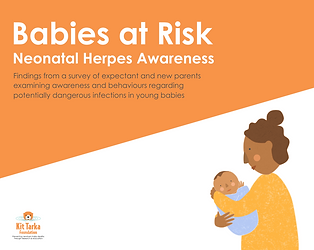Please note this website is no longer being updated as our charitable work has now passed to The Lullaby Trust. Please visit their infection guidance page for the latest information.
Babies at Risk: Neonatal Herpes Awareness
Some infections which are common and usually mild in adults and older children can be very dangerous for babies. These include group B streptococcus (GBS), varicella (chicken pox) and herpes simplex virus (HSV).
Neonatal HSV, which occurs when a newborn baby is infected with HSV, is rare but can be extremely dangerous. If left untreated, HSV infections can spread rapidly and lead to permanent disability or death. HSV can be transmitted to babies before, during or after birth.
Some HSV infections in newborn babies could be prevented by avoiding exposure to active herpes infections; this may be achieved through improved hygiene measures (such as handwashing) and not kissing babies who are not your own.
We conducted research among expectant and new parents to find out more about hygiene practices around young babies and awareness of potentially dangerous infections in babies.
Key findings
1
2
3
4
5
6
Young babies are particularly susceptible to infections, yet more than 1 in 6 mothers and birthing parents surveyed would allow a person that they did not know well to touch their baby without first washing their hands. A third of parents said they would not ask family and friends to wash their hands before holding their very young baby.
Despite increased public awareness of infection control practices during the COVID-19 pandemic, almost half of the mothers and birthing parents surveyed stated that they would allow friends and family to kiss their very young baby. This figure may have been even higher prior to the pandemic. As part of the open responses in the survey, numerous parents reported that their babies had been kissed by friends or family members without consent being given. Responses suggested that some parents were aware of the potential risks of spreading infection but did not feel comfortable or able to ask others to change their behaviour.
Most parents were aware that they should avoid kissing their baby should they develop a cold sore, but fewer knew that covering the cold sore and treating it with antiviral cream could further reduce the risk of HSV transmission.
Blisters on a breast or nipple can indicate an HSV infection, yet most breastfeeding mothers and birthing parents were not aware they should stop breastfeeding from the infected breast and seek professional advice should they experience this.
Almost 6 in 10 parents did not know that herpes infections in young babies can be extremely dangerous. This is concerning as herpes infections are extremely common amongst the general public (70%).
Advice from health professionals on herpes infections during pregnancy was lacking; almost half of women and birthing parents with a known genital herpes infection received no information on this from their midwife or doctor. Only 15% of respondents were asked about previous genital herpes infections.
Recommendations
1
2
3
4
Public health campaigns are needed to raise awareness of the dangers of cold sores to newborn babies, and the importance of good hygiene when visiting very young babies.
Expectant and new parents reported that midwives were their most commonly used source of information. Professionals working in maternity services should receive specific training on:
-
herpes infections in pregnancy and, in particular, the risks associated with primary genital herpes infections in late pregnancy;
-
how to reduce the risk of postnatal transmission of herpes infections.
All pregnant women and birthing people should be specifically asked about their history of genital herpes infection at their first midwife appointment (booking appointment). They should be advised at booking to contact their midwife or GP should they develop any symptoms of herpes during their pregnancy.
All health professionals (including GPs, pharmacists and dentists) seeing patients with new or recurrent cold sores or blisters should receive training about the risks of HSV to newborn babies, so that they are able to provide accurate advice on reducing transmission.
They do it without asking which I wish they wouldn’t! I would say no.
Mother of a baby between 0 and 3 months on answering a question about whether she let people she knew well kiss her baby, UK, 2021

.png)